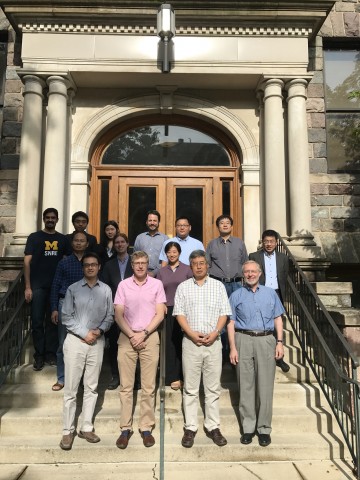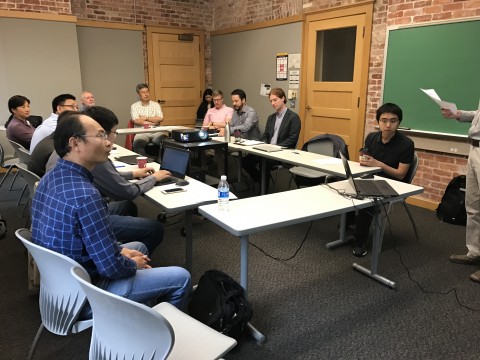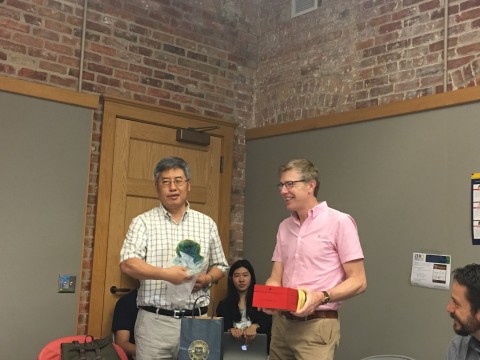Urban Food-Energy-Water (FEW) Nexus Workshop 2017



Experts in from the University of Michigan and Beijing Normal University, China gathered together on June 30, 2017 in Dana Building to discuss urban food-energy-water (FEW) nexus and find solutions for the sustainability of Detroit and Beijing. This is the annual workshop of an internationally collaborative project entitled “Integrated Systems Modeling of Food-Energy-Water (FEW) Nexus for Urban Sustainability” jointly funded by the US National Science Foundation (NSF) and the National Natural Science Foundation of China (NSFC).
With more than half of the world’s population living in urban areas, the efficient provision of food, energy, and water has become a pressing challenge for urban sustainability. This challenge comes from not only the increasing demand for FEW resources due to increased urban population, but also the complex interdependence of the urban food, energy, and water systems. The U.S. and China, two largest economies in the world, now have 81% and 54% of their populations living in urban areas, which are expected to increase to 87% and 76% by 2050, respectively. Given the different development stages, cities in the U.S. and China face common but differentiated challenges in terms of food, energy, and water.
Realizing the challenges and opportunities of the FEW nexus for urban sustainability, researchers from the University of Michigan and Beijing Normal University, China joined forces to receive joint funding from NSF and NSFC in 2016. The team, co-led by Prof. Ming Xu and Prof. Zhifeng Yang in School of Environment at Beijing Normal University, was among the three selected by NSF and NSFC for funding from almost 200 proposals submitted to the program. Through case studies in Detroit and Beijing, the U-M project will develop and demonstrate an integrated systems modeling framework by (1) characterizing the urban FEW flow networks, (2) examining the structure of the integrated network of FEW flow networks, and (3) developing and evaluating policy and technology scenarios with stakeholder inputs to identify co-benefit opportunities without unintended consequences.
The project receives approximately $1 Million funding split between NSF and NSFC for four years starting on June 1, 2016. Annual workshops will be held, rotating between Ann Arbor and Beijing. The first workshop was held in Beijing in November 2016. The second one came to Ann Arbor on June 30, 2017. At the workshop, SEAS Interim Dean Dan Brown also discussed with the delegates potential collaborations for SEAS and the School of Environment at Beijing Normal University.
Prof. Ming Xu is the Principle Investigator for this project. He is an Associate Professor in School for Environment and Sustainability and Department of Civil and Environmental Engineering. He is a core faculty member in the Center for Sustainable Systems, co-directs the Graduate Certificate Program in Industrial Ecology, and currently serves on the Advisory Committee of the University of Michigan Transportation Research Institute and the Executive Committee of the China Data Center. He is an elected Councilor of the Chinese Society for Industrial Ecology and has been Editor-in-Chief of the journal Resources, Conservation & Recycling since 2015. In addition to Prof. Xu, the U-M team includes SEAS professors Shelie Miller, Josh Newell, and Jeremiah Johnson, and Civil and Environmental Engineering Professor Nancy Love.
Schedule
9:00-9:05 Introduction of the workshop, Ming Xu, Associate Professor, UM
9:05-9:15 Welcome and introduction of SNRE and UM, Dan Brown, Professor and Interim Dean, UM
9:15-9:25 Introduction of BNU and the US-China joint project, Zhifeng Yang, Professor and Academician, BNU
9:25-9:30 Group photo
Break
Research presentations
9:40-10:00 Keynote: Decoding Urban Metabolism for Urban Sustainability: The Role of Built Environment Stocks
Gang Liu, Associate Professor, University of Southern Denmark
10:00-10:10 Quantifying Urban Food-Energy-Water (FEW) Nexus: The Case of Detroit Metropolitan Area
Ming Xu, Associate Professor, UM
10:10-10:20 System Accounting and Modeling of Urban Food-Energy-Water (FEW) Nexus
Lixiao Zhang, Professor and Associate Dean, BNU
10:20-10:30 Improving Land Use Efficiency for Fixed-tilt Utility-Scale Solar
Jeremiah Johnson, Assistant Professor, UM
10:30-10:40 Analysis of Energy Supply Based on Industrial Linkage Research: Case Study of Guangdong, China
Linyu Xu, Professor and Associate Dean, BNU
10:40-10:50 Advancing Technologies and Improving Communication of Urine-Derived Fertilizers for Food Production Within a Risk-Based Framework
Nancy Love, Borchardt and Glysson Collegiate Professor, UM
10:50-11:00 The Effects of Expanded Refrigeration on Food Waste in the Developing World
Brent Heard, PhD candidate, UM
Break
11:10-12:00 Discussion and Brainstorming (Moderated by Gang Liu)
12:00 Working lunch